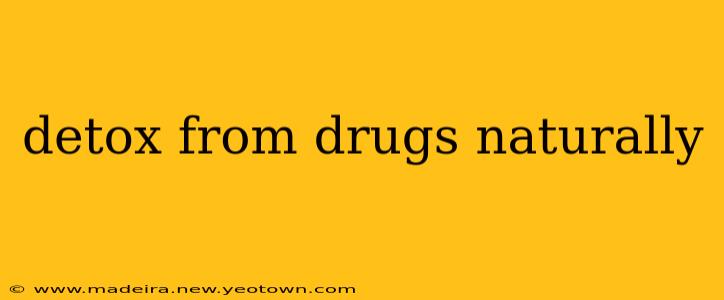Detoxing from drugs is a deeply personal and challenging journey, one that requires courage, resilience, and a strong support system. While there's no magic bullet, exploring natural approaches alongside professional medical guidance can significantly ease the process and support long-term recovery. This isn't about replacing professional medical detox; it's about complementing it with holistic strategies to improve comfort and overall well-being. Remember, always consult with a doctor or addiction specialist before attempting any detox method. They can assess your specific situation and recommend the safest and most effective approach for your needs.
What is a Natural Detox from Drugs?
A "natural detox" in this context refers to using natural methods to manage withdrawal symptoms and support the body's natural healing processes during drug cessation. This isn't about "cleansing" the body with unproven remedies, but rather about supporting your physical and mental health using holistic approaches such as nutrition, exercise, and mindfulness techniques. It's about treating the whole person, not just the addiction. This approach should always be part of a comprehensive treatment plan guided by medical professionals.
What are the Common Symptoms of Drug Withdrawal?
Withdrawal symptoms vary drastically depending on the drug, the length of use, and the individual. Common symptoms can include, but are not limited to:
- Physical Symptoms: Nausea, vomiting, diarrhea, chills, muscle aches, sweating, insomnia, fatigue, and intense cravings.
- Psychological Symptoms: Anxiety, depression, irritability, mood swings, difficulty concentrating, and paranoia.
The severity of these symptoms can range from mild discomfort to life-threatening complications. This underscores the importance of professional medical supervision during detoxification.
How Can I Support My Body Naturally During Detox?
While medical supervision is crucial, supporting your body naturally during detox can significantly ease the process. Here are some strategies:
Nutrition:
- Hydration is Key: Drink plenty of water, herbal teas (chamomile, ginger), and electrolyte-rich beverages to combat dehydration, a common side effect of withdrawal.
- Nourishing Foods: Focus on nutrient-dense foods like fruits, vegetables, lean proteins, and whole grains to support your body's healing processes.
- Avoid Processed Foods and Sugar: These can exacerbate withdrawal symptoms and hinder recovery.
Exercise:
- Gentle Movement: Start with gentle exercises like walking or yoga to improve circulation, reduce stress, and boost mood. Avoid strenuous activity during the initial stages of detox.
Mindfulness and Stress Reduction:
- Meditation and Deep Breathing: These techniques can help manage anxiety, cravings, and other psychological symptoms.
- Yoga and Tai Chi: These practices combine physical movement with mindfulness, promoting relaxation and stress reduction.
Sleep Hygiene:
- Establish a Regular Sleep Schedule: Prioritize getting enough sleep, as insomnia is a common withdrawal symptom. Create a relaxing bedtime routine to improve sleep quality.
Supplements (with medical consultation):
- Certain vitamins and minerals: A doctor may recommend specific supplements to address nutrient deficiencies often associated with substance use. Never self-medicate.
Can I Detox from Drugs Completely on My Own?
No. Attempting to detox from drugs completely on your own, especially for substances with severe withdrawal symptoms, is extremely dangerous and can be life-threatening. Professional medical supervision is essential to manage withdrawal symptoms and prevent complications. This includes medications to ease withdrawal, therapy, and ongoing support.
What are the Risks of Trying to Detox Naturally Without Medical Supervision?
Attempting to detox from drugs without professional medical help can lead to serious health complications, including:
- Seizures: Especially with alcohol or benzodiazepine withdrawal.
- Heart problems: Irregular heartbeat, high blood pressure.
- Dehydration and electrolyte imbalance: Leading to serious health consequences.
- Death: In severe cases.
What is the Best Way to Detox from Drugs?
The best way to detox from drugs is under the care of a medical professional in a medically supervised setting. This allows for monitoring of vital signs, management of withdrawal symptoms, and personalized treatment plans. This typically includes a combination of medication-assisted treatment (MAT), therapy, and support groups.
What are the Long-Term Strategies for Maintaining Sobriety After Detox?
Detox is just the first step in the recovery process. Long-term strategies for maintaining sobriety include:
- Ongoing Therapy: Individual and group therapy can provide support, coping skills, and relapse prevention strategies.
- Support Groups: Connecting with others in recovery offers a sense of community and shared experience.
- 12-Step Programs: These programs offer a structured approach to recovery, emphasizing spiritual growth and accountability.
- Medication-Assisted Treatment (MAT): For some individuals, MAT can be a valuable tool in managing cravings and preventing relapse.
This journey towards recovery is a marathon, not a sprint. Be patient with yourself, celebrate your successes, and remember that you are not alone. With the right support and a commitment to your well-being, recovery is possible. Seek professional help—it’s the most important step you can take.

